The History of Lewd: Fate/stay night
Over the course of the previous installments of this column, we’ve danced mostly around the late ’90s and early 2000s or so. Bearing that in mind, it was only a matter of time before we’d have to cover one of the most influential and interesting eroge of all time — even if these days, it’s known less as an eroge and more as a sprawling multimedia franchise.
Yes, I’m referring to Fate/stay night, which first hit the scene as an eroge in 2004 and which, to date, still doesn’t have an official localisation. Despite this, the Fate franchise in general has managed to capture the attention and imagination of fans from all over the world — so much so that pretty much every subsequent take on the series has found its way west in one form or another, be it anime, manga, video game or mobile game.
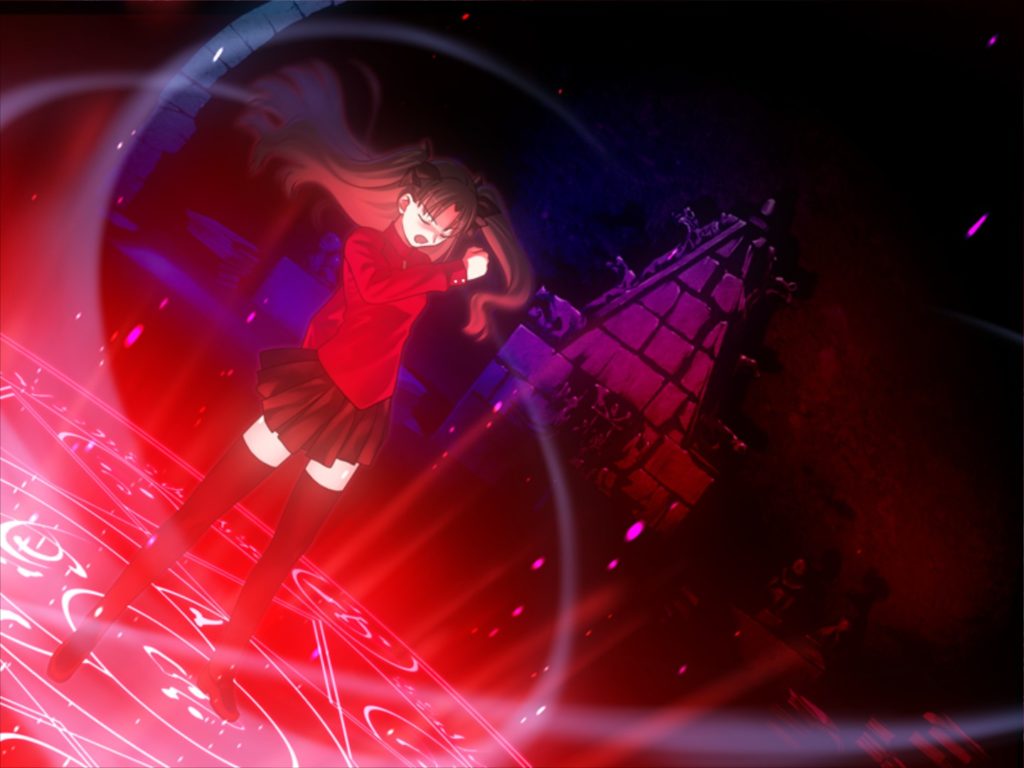
But we’re talking about the original today. While there’s no official translation out there, there is an excellent fan translation you can enjoy. Since this version incorporates both the new material from the 2012 “Réalta Nua” release as well as the adult content from the original 2004 version, in many ways this can be argued to be the “definitive Fate/stay night”.
Given its nature as a fan translation, however, I’m going to have to leave you to your own devices to track it down via one means or another. We’ll leave it at that.
Anyway. Fate/stay night is, in the words of its creators Kinoku Nasu and Takashi Takeuchi, a tale of “boy meets girl”. Speaking with Dengeki Online back in 2006, Nasu explained that the game’s main theme was “conquering oneself”, and that this concept was explored in different ways over the course of the three main narrative routes.
Saber’s route, Fate, explores the idea of “oneself as an ideal”. Rin’s route, Unlimited Blade Works, looks at “struggling with oneself as an ideal”. And Sakura’s route, Heaven’s Feel, contemplates “the friction between the real and the ideal”.
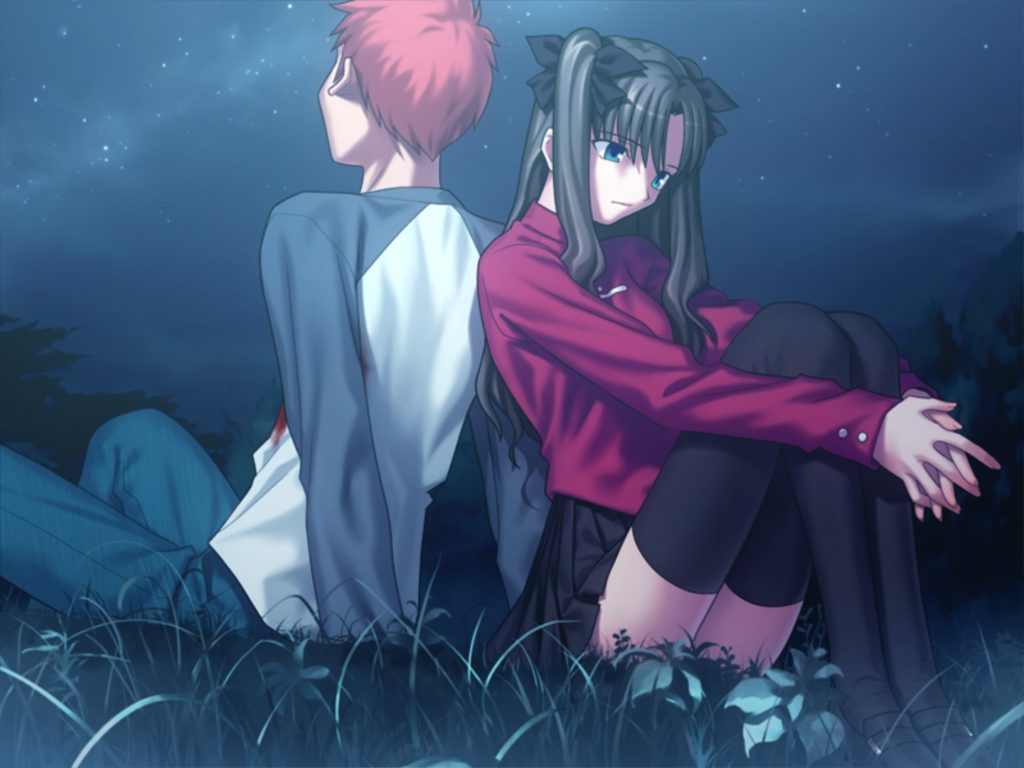
Across all three narrative routes, Fate/stay night tells the tale of Emiya Shirou and his inadvertent involvement in the “Holy Grail War”, a supernatural event which manifests itself every so often. The war challenges several magus “Masters” to use their summoned “Servants” to battle one another in order to obtain the legendary artifact and have their wish granted.
As we join the story in Fate/stay night, Shirou has accidentally discovered that he is a magus by inadvertently summoning Saber, while Rin, who actually is a magus, ends up feeling a certain amount of responsibility towards the poor chap — even though she’s technically his “opponent” in this Holy Grail War.
An exploration of the complete story of Fate/stay night across all its three routes is well beyond the scope of a single article here — we’re talking more than 80 hours of reading if you’re going for the full experience here — but suffice to say that as a creative work, it’s a fascinating, well-crafted read with a convincing narrative setup and setting, some excellent characters and several thrilling conclusions. It has truly become a worldwide phenomenon with good reason.
But you’re here to know about the lewd side of things, of course. That is, after all, what this column is about.
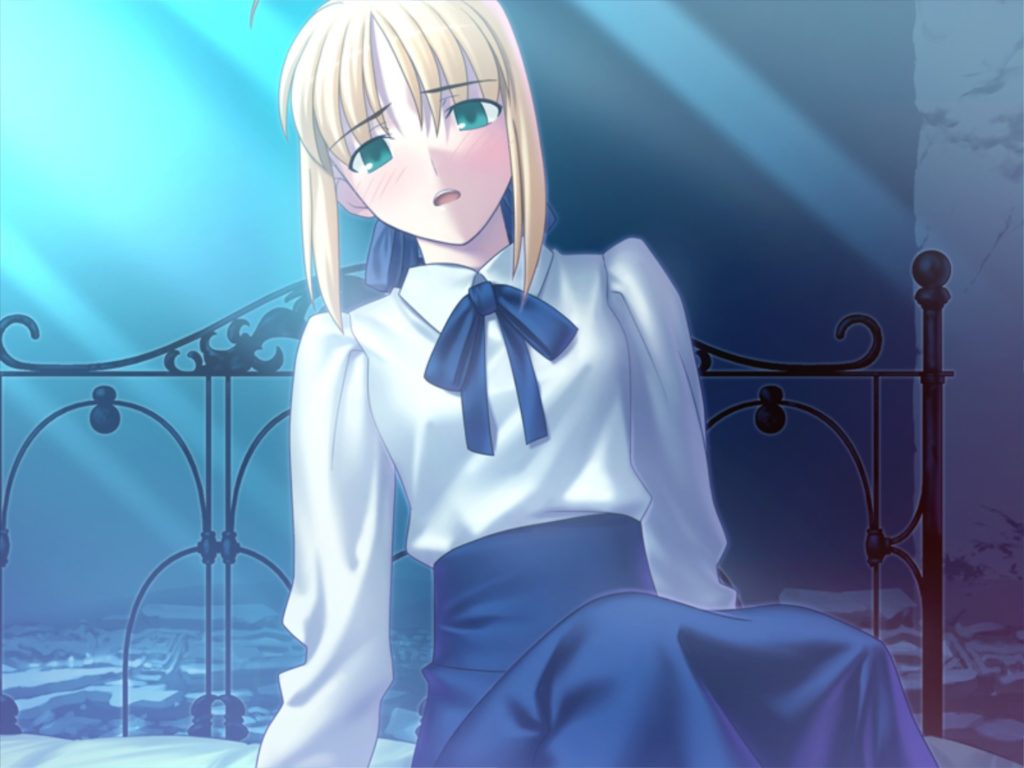
Fate/stay night — specifically, the Fate route that focuses on Saber, is the source of the trope where having sex allows people to “transfer mana” between one another. I mean, Rin outright says it at one point.
“Unison from sex is standard procedure,” she explains during a rather awkward situation where Saber is weakening and seemingly the only solution is for Shirou to knock boots with her. “The semen of a magus is a cluster of magical energy. Don’t you know that poor magi sell their semen to the Association?”
Rather than jumping right in, though, Shirou feels a certain amount of hesitance. By the point this scene occurs in the narrative, Shirou and Saber (and Shirou and Rin, for that matter) have built up a close, trusting relationship — and as such, Shirou is naturally hesitant to take that to another level, particularly under such unusual circumstances. But he clearly wants to.
“I can still feel her in my hands,” he thinks to himself, recalling how he carried her during an escape from the perilous situation that left her in this weakened state. “Her warm body, her sweating skin and her light weight… all of it was in my hands until a moment ago. If I remember that, I’m sure I’ll go after her body not because I want to save her, but just because I want her.”
Remember that theme of “oneself as an ideal”? By this point, Shirou has built up Saber to be an “ideal” in his head, and he feels that being presented with the opportunity to “have” her without having to “work” for it will bring his perception of her crashing down in all manner of ways — primarily because it means that she would no longer be unattainable. That unattainability was part of how he had idealised her in his head, after all.

A similar situation occurs during Unlimited Blade Works, where Shirou finds himself in the position of requiring an enormous amount of magical energy to perform a particular task, but not having enough in his own inexperienced body to pull it off by himself. Naturally, the only way to resolve this is for Shirou to form a contract with Rin by having sex with her, which will allow them to share their magical energy with one another.
Given that this is Rin’s route, it will not be surprising for you to learn that Rin has, of course, already fallen in love with Shirou by this point, but in true “be gentle, it’s my first time” tradition, the experience is less than pleasant for her. She persists, though; in this instance, she knows that more is at stake than her own comfort and wellbeing.
Finally, the Heaven’s Feel route explores the idea of reality versus ideal through the character of Sakura, who throughout all the previous routes has been represented as something of a “perfect wife” figure — always present in the early hours of each story path, even when Shirou’s interest and focus clearly lies elsewhere and thus ends her to effectively be “written out” of the stories by their respective midpoints.
Sakura is an embodiment of the friction between real and ideal. While the front she puts up to Shirou, Rin and Saber is that of this perfect, demure, compliant, blushing housewife, as Heaven’s Feel unfolds it becomes clear that she’s struggling with plenty of her own issues. The most significant of these is her turbulent home life and her troubling relationship with her brother Shinji — and, as it turns out, her grandfather Zouken.
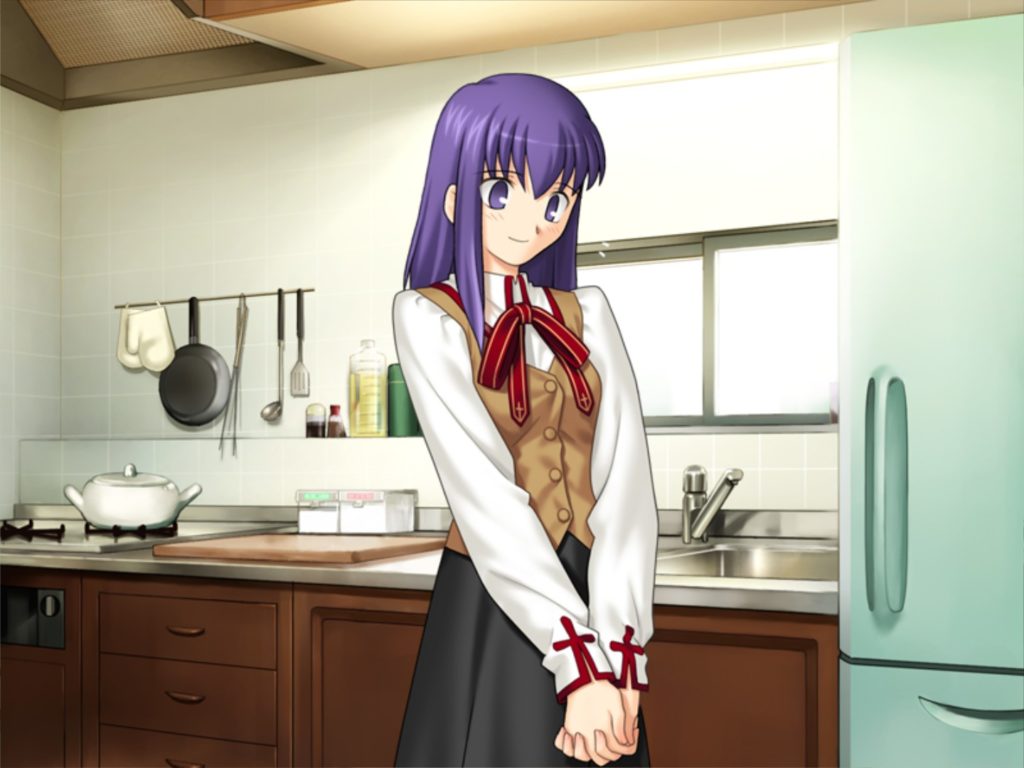
Again, the details of all this are well beyond the scope of a single article, but suffice to say that Sakura has suffered considerable abuse over the course of her life — including sexual abuse. As a result, she is in a position where she has no real freedom to do as she pleases — and moreover, she subverts the common trope of eroge heroines being pure virgins until their first sexual encounter with the protagonist.
The reason for this is symbolic in many cases — the act of a heroine “giving” her virginity to the protagonist represents a deep sense of trust between the pair, and the fact these scenes often place quite a focus on the initial pain of penetration reflects the courage it takes to let someone in your heart and reveal your true self. Despite the sense of “necessity” in the sex scenes between Shirou, Saber and Rin, this trope is still present — and yet in Sakura’s route, where it would perhaps feel most “appropriate” given her character setup, there’s no opportunity for the couple to enjoy this most intimate of moments together.
Prior to these revelations, Sakura asked Shirou if he would forgive her if she became a “bad person”. At the time, Shirou replied that he’d get mad — more mad than anyone else. Naturally, this makes Sakura somewhat hesitant to speak of her trauma, because she believes that she’s done something bad and that she’s “impure”; this is a sad reflection of the misplaced sense of guilt victims of sexual abuse often feel, and is one of the most fascinating parts of Sakura’s narrative.
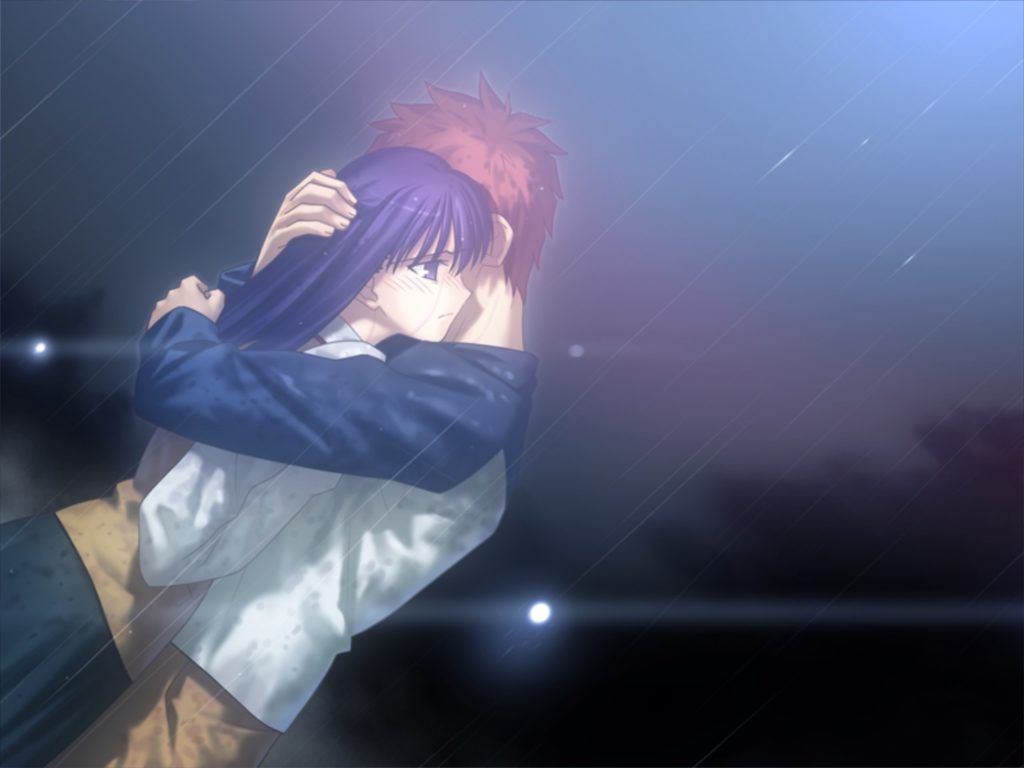
With this in mind, the times where Sakura and Shirou do end up being intimate with one another are significant — but there’s a sense of discomfort to them as they progress. Elements elsewhere in the story cause Sakura to start losing her grip on reality, her understanding of “good” and “evil” and her restraints on how she “should” behave. And with each of the erotic scenes throughout Heaven’s Feel, it becomes more and more clear that something is very much Not Right with Sakura.
While a lot of people say they prefer that the erotic angle of the original Fate/stay night is mostly ignored these days, these scenes are actually very effective in context; in a similar fashion to how Saya no Uta makes use of sexual scenes not to titillate but to horrify, in Fate/stay night the sex scenes are consistently, intentionally awkward and deliberately disquieting.
This is not an erotic game that you play if you want a quick fap — among other reasons, the sex scenes in all three routes don’t show up until a good 20 or more hours into each playthrough — but rather if you want to see sex used as an interesting means of exploring various aspects of horror, and how it can enhance the characterisation of individuals caught in extreme, terrifying situations.
Join The Discussion
Rice Digital Discord
Rice Digital Twitter
Rice Digital Facebook
Or write us a letter for the Rice Digital Friday Letters Page by clicking here!
Disclosure: Some links in this article may be affiliate links, which means we may earn a small commission if you make a purchase after clicking on them. This is at no additional cost to you and helps support Rice Digital!
- Letter from the Editor: passing the torch - June 30, 2023
- Super Woden GP 2 is looking promising - June 30, 2023
- Inti Creates is making a 32 bit-style Love Live action platformer - June 26, 2023







